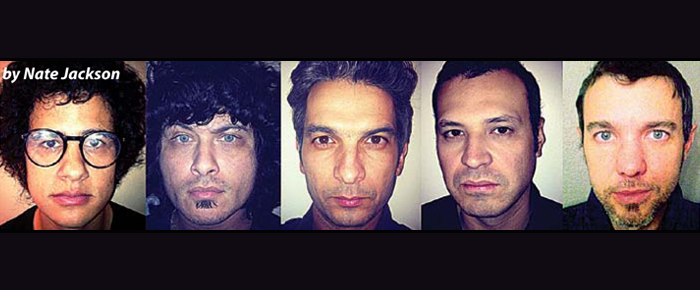
By Nate Jackson
Legendary post-hardcore outfit At the Drive-In is reuniting to perform at Coachella this year. But the group — whose members Omar Rodríguez-López and Cedric Bixler-Zavala eventually splintered to join Mars Volta — didn’t know what expect when, in November, they switched on their amps to play together for the first time in 11 years.
But together with Jim Ward, Paul Hinojos and Tony Hajjar, they all gathered in El Paso, Texas to find out if burying the hatchet meant they were ready to make music together again. They answered that question with a seething mesh of raw, unrehearsed punk rock power. “We knew within 15 minutes of jamming that we were good,” says Hajjar, who lives in L.A.
“We didn’t play old songs, we just started playing. I could tell from everyone’s movements and smiles that this was right.”
Months before announcing their Coachella reunion, At the Drive-In’s revival was confirmed with an impromptu jam session. But the years of ground work needed to get them performing together took patient orchestration and timing. From repairing their personal relationships to launching a new record label, every move to reform the band has gotten its members closer to reclaiming the control they lost at the height of their success.
Formed in 1993 in El Paso, At the Drive-In’s aggressively-articulate post punk sound made an indelible mark on indie rock culture. Seven years, three studio albums, and five EP’s later, they received a whirlwind of success with 2000’s Relationship of Command. However, personal differences caused the band to implode in 2001. Fans watched as Rodriguez-Lopez and Bixler-Zavala went on to form the Latin-infused psychedelic prog outfit The Mars Volta while Ward, Hinojos and Hajjar founded alternative rock act Sparta.
Three years ago, the band members who’d grown up in a van together from their teens to mid-20s decided to heal their longtime rift, spending a weekend patching things up at Rodriguez-Lopez’ house in Mexico.
In November they received the master recordings for Relationship of Command through a reversion deal with their former label, Fearless Records. With a patched friendship and their old album in their laps, the members are launching a new label, called Twenty-first Chapter, which will re-release the album. (The name references the last chapter in the original version of the novel A Clockwork Orange where Alex, story’s the violent central character, makes amends on all of the sins he’s committed.)
“We started talking about it, and then of course people hear we’re talking about it,” Rodriguez-Lopez says. “And then Paul Tollet at Coachella, who offers us money every year to get back together and play hears about it…then it all starts to become a reality.”
But they say it wasn’t about the money necessarily: they just wanted to play together again.
“The most exciting part to me is that there’s not a firm ending to this band,” Ward says. “This isn’t the sort of thing where we’re taking advantage of the reunion status and going and doing as many festivals as we can. We’re doing this very slowly and we literally don’t know what’s going to happen.”
As for the anticipation of what a modern day At the Drive-In might sound like, Ward and his band mates avoid getting wrapped up in fan’s grandiose expectations And after years of being non-operational; fans aren’t the only ones who will be surprised by what what the band does on stage.
“When people come to the shows, they’ll see what we are,” Ward says. “When we get to the show, we’ll see what we are.”
Original write fo LA Weekly











































Comments are closed.